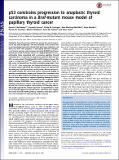p53 constrains progression to anaplastic thyroid carcinoma in a Braf-mutant mouse model of papillary thyroid cancer
Author(s)
McFadden, David Glenn; Vernon, Amanda; Santiago, Philip M.; Martinez-McFaline, Raul; Crowley, Denise M.; McMahon, Martin; Sadow, Peter M.; Bhutkar, Arjun; Jacks, Tyler E; ... Show more Show less
DownloadMcFadden-2014-p53 constrains progression.pdf (2.862Mb)
PUBLISHER_POLICY
Publisher Policy
Article is made available in accordance with the publisher's policy and may be subject to US copyright law. Please refer to the publisher's site for terms of use.
Terms of use
Metadata
Show full item recordAbstract
Anaplastic thyroid carcinoma (ATC) has among the worst prognoses of any solid malignancy. The low incidence of the disease has in part precluded systematic clinical trials and tissue collection, and there has been little progress in developing effective therapies. v-raf murine sarcoma viral oncogene homolog B (BRAF) and tumor protein p53 (TP53) mutations cooccur in a high proportion of ATCs, particularly those associated with a precursor papillary thyroid carcinoma (PTC). To develop an adult-onset model of BRAF-mutant ATC, we generated a thyroid-specific CreER transgenic mouse. We used a Cre-regulated Braf[superscript V600E] mouse and a conditional Trp53 allelic series to demonstrate that p53 constrains progression from PTC to ATC. Gene expression and immunohistochemical analyses of murine tumors identified the cardinal features of human ATC including loss of differentiation, local invasion, distant metastasis, and rapid lethality. We used small-animal ultrasound imaging to monitor autochthonous tumors and showed that treatment with the selective BRAF inhibitor PLX4720 improved survival but did not lead to tumor regression or suppress signaling through the MAPK pathway. The combination of PLX4720 and the mapk/Erk kinase (MEK) inhibitor PD0325901 more completely suppressed MAPK pathway activation in mouse and human ATC cell lines and improved the structural response and survival of ATC-bearing animals. This model expands the limited repertoire of autochthonous models of clinically aggressive thyroid cancer, and these data suggest that small-molecule MAPK pathway inhibitors hold clinical promise in the treatment of advanced thyroid carcinoma.
Date issued
2014-04Department
Massachusetts Institute of Technology. Department of Biology; Massachusetts Institute of Technology. Department of Brain and Cognitive Sciences; Koch Institute for Integrative Cancer Research at MITJournal
Proceedings of the National Academy of Sciences
Publisher
National Academy of Sciences (U.S.)
Citation
McFadden, D. G., A. Vernon, P. M. Santiago, R. Martinez-McFaline, A. Bhutkar, D. M. Crowley, M. McMahon, P. M. Sadow, and T. Jacks. “P53 Constrains Progression to Anaplastic Thyroid Carcinoma in a Braf-Mutant Mouse Model of Papillary Thyroid Cancer.” Proceedings of the National Academy of Sciences 111, no. 16 (April 7, 2014): E1600–E1609.
Version: Final published version
ISSN
0027-8424
1091-6490